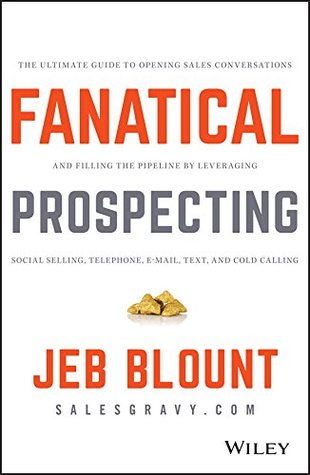More on this book
Community
Kindle Notes & Highlights
by
Jeb Blount
Read between
February 5 - February 5, 2019
The 30-Day Rule states that the prospecting you do in this 30-day period will pay off for the next 90 days. It is a simple, yet powerful universal rule that governs sales and you ignore it at your peril. When you internalize this rule, it will drive you to never put prospecting aside for another day. The implication of the 30-Day Rule is simple. Miss a day of prospecting and it will tend to bite you sometime in the next 90 days. Miss a week and you will feel it in your commission check. Miss the entire month and you will tank your pipeline, fall into a slump, and wake up 90 days later
...more
One of my absolute favorite quotes is from Arnold Palmer: “The more I practice, the luckier I get.” There is a parallel singularity in sales: The more you prospect, the luckier you get.
Efficiency + Effectiveness = Performance (E + E = P)
This is why you must gather the courage and self-discipline to track, analyze, and make regular adjustments based on your prospecting performance stats. Keeping count keeps you grounded in reality and focused on your daily goal. It ensures that you remain honest with yourself about where you really stand against your targets and what you need to do or sacrifice to get back on track if you are missing your number.
There are three mindsets that hold salespeople back from prospecting: procrastination, perfectionism, and paralysis from analysis.
Every major failure in my life has been a direct result of a collapse in my self-discipline to do the little things every day.
Deals that are unprofitable, unqualified, not in the buying window, don't have a budget, don't have an identified decision maker, or because of contracts don't have the ability to buy.
wasting endless hours working on ugly deals that will never close.
Your drive as a sales professional should always be to spend your time with the most qualified prospects in your database.
This includes the optimal time for engaging the prospect prior to the opening of the buying window.
Analyze the deals you are closing and gain a deeper understanding of trigger events that open buying windows.
In his book Smart Calling, Art Sobczak calls these assumptions about WIIFMs “Possible Value Propositions.” He suggests that for each class of prospect and decision-maker role, you should take time to define the possible reasons that would create enough WIIFM for them to give up
Offers proof or evidence: When you can provide information about how much you have helped prospects in similar situations, you gain instant credibility.
On the flip side, if you work for a well-known brand and are meeting with small business owners who regularly use products like yours, asking for a few minutes to “learn more about their business” can work like a charm. Why? Because small business owners like to talk about themselves and the risk of taking a few minutes to meet with you is low.
Weinberg says you need to answer the question, “Why do my customers choose to do business with me?” This is how you define why you are truly different from your competition—not just your company, product, or service, but you. Like Weinberg says, “Differentiation gets the attention of your prospect.”
For example, just saying, “I'd like 15 minutes of your time because I want to learn more about you and your company” works surprisingly well with many prospects.
Start by answering these questions from your prospect's perspective: What would cause you stress? When do you feel stress? What makes you worry? When do you worry? Why do you worry? What creates anxiety? When do you feel
anxiety? How do you feel when you run out of time for important things? How do you feel when you don't have enough money to accomplish your goals? When does this happen? How do you feel when you don't have enough resources to accomplish your goals? When does this happen? How do you feel when you don't have the knowledge to accomplish your goals? When does this happen? How do you feel when you fail to accomplish your goals? When do you get overwhelmed, and how does it feel? What impacts your peace of mind or sense of security?
How would it feel to have limited options? What is causing you to feel frustrated or stuck? What makes you mad? What causes you to feel distrust? What causes you fear? What causes you anguish? How do you feel when ______ happens? What might you want to know? What unknown would make you worry? What information would you fear getting into your competitor's hands? What might a competitor be doing t...
This highlight has been truncated due to consecutive passage length restrictions.
What would cause you to be curious? What might be stealing your time,...
This highlight has been truncated due to consecutive passage length restrictions.


